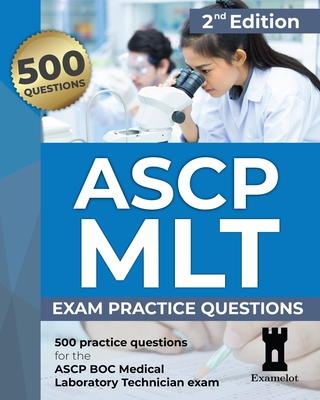ASCP MLT Exam: Practice Questions, 2nd edition

ASCP MLT Exam: Practice Questions, 2nd edition
2. Urinalysis and other body fluids
3. Chemistry
4. Hematology
5. Immunology
6. Microbiology
7. Laboratory operations Questions mirror the types of questions you'll encounter on the ASCP MLT exam. Answers are provided at the end of each section, complete with explanations to help deepen your understanding. New to this edition: 100 new questions Corrections and refinements to previous questions Updates to align with the latest ASCP MLS exam guidelines This book is also a valuable resource for those taking the ASCP MLS exam, as both exams share similar content. This book offers unique questions, different from those in the ASCP MLS Exam: Practice Questions book. ---SAMPLE QUESTIONS--- Below are six sample questions from the book: 1) BLOOD BANKING
The _____________ effect is the phenomenon of stronger antigen expression with homozygous genotypes than heterozygous genotypes.
a. dosage
b. homozygous
c. position
d. prozone Answer: a. dosage
Explanation: The dosage effect is when an antigen reacts more strongly when there are two copies of a gene (homozygous) than when there is only one copy (heterozygous). 2) URINALYSIS AND OTHER BODY FLUIDS
What is nocturia?
a. Blood in the urine
b. Difficulty urinating
c. Excessive urination at night
d. Pain during a period Answer: c. Excessive urination at night
Explanation: Nocturia is the condition of waking up during the night to urinate. It can disrupt sleep and is often a symptom of underlying health issues such as diabetes, heart failure, or urinary tract infections. 3) HEMATOLOGY
Which type of immunoglobulin is the Donath-Landsteiner antibody?
a. IgA
b. IgD
c. IgG
d. IgM Answer: c. IgG
Explanation: The Donath-Landsteiner antibody is an IgG autoantibody that causes a rare disorder called paroxysmal cold hemoglobinuria. The antibody binds to red blood cells in cold temperatures, leading to hemolysis when the blood warms to 37 C. 4) IMMUNOLOGY
Which of these diseases is a viral infection of the liver?
a. Hepatitis B
b. HIV
c. Syphilis
d. Tuberculosis Answer: a. Hepatitis B
Explanation: Of the possible answers, only hepatitis B is a viral inf
PRP: 154.92 Lei
Acesta este Prețul Recomandat de Producător. Prețul de vânzare al produsului este afișat mai jos.
139.43Lei
139.43Lei
154.92 LeiLivrare in 2-4 saptamani
Descrierea produsului
2. Urinalysis and other body fluids
3. Chemistry
4. Hematology
5. Immunology
6. Microbiology
7. Laboratory operations Questions mirror the types of questions you'll encounter on the ASCP MLT exam. Answers are provided at the end of each section, complete with explanations to help deepen your understanding. New to this edition: 100 new questions Corrections and refinements to previous questions Updates to align with the latest ASCP MLS exam guidelines This book is also a valuable resource for those taking the ASCP MLS exam, as both exams share similar content. This book offers unique questions, different from those in the ASCP MLS Exam: Practice Questions book. ---SAMPLE QUESTIONS--- Below are six sample questions from the book: 1) BLOOD BANKING
The _____________ effect is the phenomenon of stronger antigen expression with homozygous genotypes than heterozygous genotypes.
a. dosage
b. homozygous
c. position
d. prozone Answer: a. dosage
Explanation: The dosage effect is when an antigen reacts more strongly when there are two copies of a gene (homozygous) than when there is only one copy (heterozygous). 2) URINALYSIS AND OTHER BODY FLUIDS
What is nocturia?
a. Blood in the urine
b. Difficulty urinating
c. Excessive urination at night
d. Pain during a period Answer: c. Excessive urination at night
Explanation: Nocturia is the condition of waking up during the night to urinate. It can disrupt sleep and is often a symptom of underlying health issues such as diabetes, heart failure, or urinary tract infections. 3) HEMATOLOGY
Which type of immunoglobulin is the Donath-Landsteiner antibody?
a. IgA
b. IgD
c. IgG
d. IgM Answer: c. IgG
Explanation: The Donath-Landsteiner antibody is an IgG autoantibody that causes a rare disorder called paroxysmal cold hemoglobinuria. The antibody binds to red blood cells in cold temperatures, leading to hemolysis when the blood warms to 37 C. 4) IMMUNOLOGY
Which of these diseases is a viral infection of the liver?
a. Hepatitis B
b. HIV
c. Syphilis
d. Tuberculosis Answer: a. Hepatitis B
Explanation: Of the possible answers, only hepatitis B is a viral inf
Detaliile produsului










